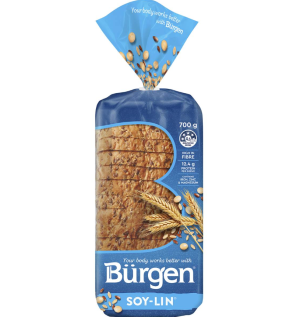Aussie dietitian exposes budget supermarket foods to avoid
As we navigate the aisles of our local supermarkets, the array of choices can be overwhelming, especially when we're trying to balance our budgets with the desire to eat healthily.
With the cost of living on the rise, it's tempting to reach for the cheapest items on the shelf, but according to one Sydney-based dietitian, this could be a false economy when it comes to our health and wellbeing.
Susie Burrell, a respected Aussie dietitian, shared her insights on which budget supermarket foods she avoids and why she believes that investing a little more in certain items is worth it for the nutritional benefits they offer.
As members of the Seniors Discount Club, we're always looking for ways to make our dollars stretch further, but not at the expense of our health. So let's delve into Susie's recommendations and see how we can apply her advice to our shopping habits.

When it comes to proteins, Susie is adamant about choosing quality over quantity.
She splurges on lean meats such as steak, lamb fillets, extra-lean mince, and Tassal salmon.
These choices are not only lower in fat but also packed with essential nutrients.
Susie warned against budget-friendly fatty meats like pork belly, regular mince, and chicken drumsticks and wings, which may be cheaper but are also higher in fat and lower in protein.
She also has a keen eye for the crackers aisle. She opts for high-quality options with grains, such as Vita Wheat 9-grain biscuits, which boast a 'clean' ingredient list free from vegetable oils and refined flours.
Susie explained: ‘Most commercial crackers have a base of white flour and vegetable oil, which is generally palm oil. This mix of refined flour and processed oil offers nothing positive nutritionally.’
Breakfast cereals are another area where Susie doesn't cut corners. She prefers brands like Multigrain Weetbix or Carman's fruit-free granola, which contain less sugar and are rich in nutritious grains and seeds.
These cereals not only taste great but also keep you feeling full longer, helping you avoid the temptation of snacking on less healthy options throughout the morning.
When it comes to bread, Susie's go-to is dense grain loaves like Burgen Soy Lin bread.
She advised against gluten-free products unless medically necessary, as they can be highly processed. Instead, she recommended wholegrain options that are more nutrient-dense.
Susie also ranked the top eight supermarket breads based on their nutritional value.
In the fresh produce section, Susie is all about in-season fruits and vegetables, which are not only more flavorful but also packed with vitamins and minerals.
She highlighted oranges, kiwis, and greens like broccoli, which can be bought fresh or frozen to boost nutrient intake, especially during the colder months.
She stated: ‘All fruit is good for us, especially Vitamin C-rich options like citrus and kiwi, but watch out for juices and dried fruit which is a lot more concentrated.’
Lastly, Susie doesn't skimp on stock, an essential ingredient for hearty winter soups.
She prefers brands like Maggie Beer, which may be pricier but contain less salt and fewer additives.
So, dear members, while it might seem counterintuitive to spend more on certain items at the supermarket, Susie Burrell's advice highlights the importance of investing in our health through the foods we eat.
By choosing quality proteins, whole grains, and nutrient-rich produce, we're not only nourishing our bodies but also potentially reducing future healthcare costs by maintaining a healthier lifestyle.
 We'd love to hear from you about your own supermarket strategies. Do you have any tips for balancing the budget with nutritional needs? Have you found certain splurges at the grocery store that are worth the extra penny for your health? Share your experiences in the comments below!
We'd love to hear from you about your own supermarket strategies. Do you have any tips for balancing the budget with nutritional needs? Have you found certain splurges at the grocery store that are worth the extra penny for your health? Share your experiences in the comments below!
With the cost of living on the rise, it's tempting to reach for the cheapest items on the shelf, but according to one Sydney-based dietitian, this could be a false economy when it comes to our health and wellbeing.
Susie Burrell, a respected Aussie dietitian, shared her insights on which budget supermarket foods she avoids and why she believes that investing a little more in certain items is worth it for the nutritional benefits they offer.
As members of the Seniors Discount Club, we're always looking for ways to make our dollars stretch further, but not at the expense of our health. So let's delve into Susie's recommendations and see how we can apply her advice to our shopping habits.

A Sydney-based dietitian stated that it is worth buying expensive but nutritious food. Image source: Freepik
When it comes to proteins, Susie is adamant about choosing quality over quantity.
She splurges on lean meats such as steak, lamb fillets, extra-lean mince, and Tassal salmon.
These choices are not only lower in fat but also packed with essential nutrients.
Susie warned against budget-friendly fatty meats like pork belly, regular mince, and chicken drumsticks and wings, which may be cheaper but are also higher in fat and lower in protein.
She also has a keen eye for the crackers aisle. She opts for high-quality options with grains, such as Vita Wheat 9-grain biscuits, which boast a 'clean' ingredient list free from vegetable oils and refined flours.
Susie explained: ‘Most commercial crackers have a base of white flour and vegetable oil, which is generally palm oil. This mix of refined flour and processed oil offers nothing positive nutritionally.’
Breakfast cereals are another area where Susie doesn't cut corners. She prefers brands like Multigrain Weetbix or Carman's fruit-free granola, which contain less sugar and are rich in nutritious grains and seeds.
These cereals not only taste great but also keep you feeling full longer, helping you avoid the temptation of snacking on less healthy options throughout the morning.
When it comes to bread, Susie's go-to is dense grain loaves like Burgen Soy Lin bread.
She advised against gluten-free products unless medically necessary, as they can be highly processed. Instead, she recommended wholegrain options that are more nutrient-dense.
Susie also ranked the top eight supermarket breads based on their nutritional value.
In the fresh produce section, Susie is all about in-season fruits and vegetables, which are not only more flavorful but also packed with vitamins and minerals.
She highlighted oranges, kiwis, and greens like broccoli, which can be bought fresh or frozen to boost nutrient intake, especially during the colder months.
She stated: ‘All fruit is good for us, especially Vitamin C-rich options like citrus and kiwi, but watch out for juices and dried fruit which is a lot more concentrated.’
Lastly, Susie doesn't skimp on stock, an essential ingredient for hearty winter soups.
She prefers brands like Maggie Beer, which may be pricier but contain less salt and fewer additives.
So, dear members, while it might seem counterintuitive to spend more on certain items at the supermarket, Susie Burrell's advice highlights the importance of investing in our health through the foods we eat.
By choosing quality proteins, whole grains, and nutrient-rich produce, we're not only nourishing our bodies but also potentially reducing future healthcare costs by maintaining a healthier lifestyle.
Key Takeaways
- A leading Australian dietitian, Susie Burrell, advised against purchasing budget versions of certain food items due to nutritional and quality concerns.
- Susie highlighted the importance of investing in lean proteins, such as extra-lean mince and salmon, as well as high-quality grains in items like crackers and breakfast cereals.
- The dietitian recommended steering clear of highly processed items and fatty meats, opting instead for dense grain bread and nutrient-rich, in-season fruit and vegetables.
- When it comes to stocks and other ingredients that can be used in cooking and meal preparation, Susie prefers products with lower salt content and fewer additives, such as those from the Maggie Beer range.








